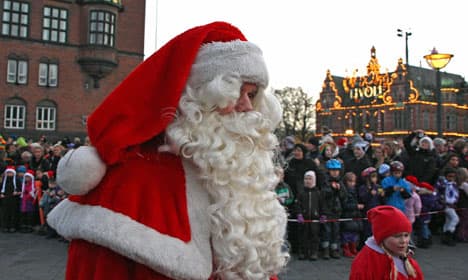Danish Christmas: Fun, festive and flammable

Brace yourselves, it’s Christmas. And Christmas in Denmark is really quite the production, as columnist Michael Booth explains.
If you think the Brits, the Germans or the Americans go ape over Yuletide, none are as chronically afflicted by collective seasonal psychosis as the Danes.
Thus December is an orgy of cinnamon, singing and discretely understated decoration (you can forget about tinsel and anything glittery), with lashings of goose, potatoes cooked - for reasons best known to the Danes - in sugar, and rice pudding with an almond prize.
As the month gathers pace, a nation of nisser in hilarious red and white hats fills the fairy-lit town squares and frosted landscape. Already last week, to be out and about in Copenhagen was to run the gauntlet of hoards of shoppers laden down with vast carrier bags like the panniers on a pilgrim’s mule. I still have the bruises on my thighs to prove it.
Stopping for a moment to marvel at the reinstated Christmas lights on the Hotel d’Angleterre, I was clobbered by a sharp-cornered package in an Illum bag wielded by an elderly lady in ankle-length mink. My primal howl of pain was drowned out by buskers singing the Danes’ most beloved traditional seasonal song, Wham’s ‘Last Christmas’ (played on solid rotation on all radio stations throughout December: it’s the law).
Something about the Danish mentality fits so well with Christmas: perhaps it is their Hobbit-like obsession with snuggling down into a cosy cocoon that marries perfectly with the marking of the mid-winter solstice, or their love of eating as much unhealthy food as possible as well, of course, as consuming vast quantities of booze, that chimes with this season’s abiding spirit of grotesque over-consumption.
In surveys, the Danes say that they enjoy getting together with their families more than any other nationality, which has got to help, but they also like to celebrate with friends and, most interestingly of all from an anthropological point of view, with work colleagues.
For it is in the ritual of the julefrokost, or Christmas Lunch, that the Danes reveal their true Juletide selves. This is when the mask drops, when the beast is let loose, and the rampant festive frenzy reaches the heights of debauchery. This is when Jens from marketing gets off with Hanne from accounts. When Mogens from sales tells Lars the CEO exactly what he thinks of him, and everyone else gets rat-faced, falls over, pukes their guts up and then wakes up the next morning - usually, although not always, in their own bed - not really remembering how they made it home.
And the next day at work, all is forgotten. Everyone returns to their desks with a head like a bucket full of broken glass and a tongue like the bottom of a bird cage, but no hard feelings. Such are the benefits of alcohol-induced amnesia.
And then comes the big day itself: December 24th. In the morning, at least as far as my Danish family is concerned, one fashions strange, lumpen confections out of industrially produced nougat, marzipan and a chocolate-like substance. Then comes church, to which the vast majority of Danes slink sheepishly - this being their only visit for the year - to endure the annual sermon about how church is not just for Christmas. Then it is home for a colossal binge featuring the aforementioned candied potatoes and gut-busting rice pudding, before the gift bonanza which usually lasts way into the night, and way beyond the point at which children become insufferably fractious.
But still, even an old humbugger like me has to admit, the Danes give great Christmas. Though the sight of real candles on a brittle, room-dried Christmas tree always brings to mind the house burning scene in ‘Gone With the Wind’ (and the bucket full of water which I insist on installing among the presents does rather distract from the seasonal ambience) I actually think they are world champions at it.
The only problem is that, as the gospel according to Boney M tells us, Mary’s boy child, Jesus Christ was in fact born on Christmas Day.
And that, dear Danes, is December 25th.
Note to readers: This article was originally published on December 9, 2014.
 Michael Booth is the author of The Almost Nearly Perfect People: The Truth About the Nordic Miracle available now on Amazon and is a regular contributor to publications including the Guardian and Monocle
Michael Booth is the author of The Almost Nearly Perfect People: The Truth About the Nordic Miracle available now on Amazon and is a regular contributor to publications including the Guardian and Monocle
Comments
See Also
If you think the Brits, the Germans or the Americans go ape over Yuletide, none are as chronically afflicted by collective seasonal psychosis as the Danes.
Thus December is an orgy of cinnamon, singing and discretely understated decoration (you can forget about tinsel and anything glittery), with lashings of goose, potatoes cooked - for reasons best known to the Danes - in sugar, and rice pudding with an almond prize.
As the month gathers pace, a nation of nisser in hilarious red and white hats fills the fairy-lit town squares and frosted landscape. Already last week, to be out and about in Copenhagen was to run the gauntlet of hoards of shoppers laden down with vast carrier bags like the panniers on a pilgrim’s mule. I still have the bruises on my thighs to prove it.
Stopping for a moment to marvel at the reinstated Christmas lights on the Hotel d’Angleterre, I was clobbered by a sharp-cornered package in an Illum bag wielded by an elderly lady in ankle-length mink. My primal howl of pain was drowned out by buskers singing the Danes’ most beloved traditional seasonal song, Wham’s ‘Last Christmas’ (played on solid rotation on all radio stations throughout December: it’s the law).
Something about the Danish mentality fits so well with Christmas: perhaps it is their Hobbit-like obsession with snuggling down into a cosy cocoon that marries perfectly with the marking of the mid-winter solstice, or their love of eating as much unhealthy food as possible as well, of course, as consuming vast quantities of booze, that chimes with this season’s abiding spirit of grotesque over-consumption.
In surveys, the Danes say that they enjoy getting together with their families more than any other nationality, which has got to help, but they also like to celebrate with friends and, most interestingly of all from an anthropological point of view, with work colleagues.
For it is in the ritual of the julefrokost, or Christmas Lunch, that the Danes reveal their true Juletide selves. This is when the mask drops, when the beast is let loose, and the rampant festive frenzy reaches the heights of debauchery. This is when Jens from marketing gets off with Hanne from accounts. When Mogens from sales tells Lars the CEO exactly what he thinks of him, and everyone else gets rat-faced, falls over, pukes their guts up and then wakes up the next morning - usually, although not always, in their own bed - not really remembering how they made it home.
And the next day at work, all is forgotten. Everyone returns to their desks with a head like a bucket full of broken glass and a tongue like the bottom of a bird cage, but no hard feelings. Such are the benefits of alcohol-induced amnesia.
And then comes the big day itself: December 24th. In the morning, at least as far as my Danish family is concerned, one fashions strange, lumpen confections out of industrially produced nougat, marzipan and a chocolate-like substance. Then comes church, to which the vast majority of Danes slink sheepishly - this being their only visit for the year - to endure the annual sermon about how church is not just for Christmas. Then it is home for a colossal binge featuring the aforementioned candied potatoes and gut-busting rice pudding, before the gift bonanza which usually lasts way into the night, and way beyond the point at which children become insufferably fractious.
But still, even an old humbugger like me has to admit, the Danes give great Christmas. Though the sight of real candles on a brittle, room-dried Christmas tree always brings to mind the house burning scene in ‘Gone With the Wind’ (and the bucket full of water which I insist on installing among the presents does rather distract from the seasonal ambience) I actually think they are world champions at it.
The only problem is that, as the gospel according to Boney M tells us, Mary’s boy child, Jesus Christ was in fact born on Christmas Day.
And that, dear Danes, is December 25th.
Note to readers: This article was originally published on December 9, 2014.
 Michael Booth is the author of The Almost Nearly Perfect People: The Truth About the Nordic Miracle available now on Amazon and is a regular contributor to publications including the Guardian and Monocle
Michael Booth is the author of The Almost Nearly Perfect People: The Truth About the Nordic Miracle available now on Amazon and is a regular contributor to publications including the Guardian and Monocle
Join the conversation in our comments section below. Share your own views and experience and if you have a question or suggestion for our journalists then email us at [email protected].
Please keep comments civil, constructive and on topic – and make sure to read our terms of use before getting involved.
Please log in here to leave a comment.